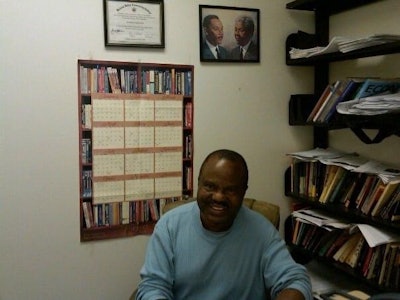With a plan to pursue a postsecondary degree, Frederick Kakumba left Uganda in 1964 to come to the United States.
“The opportunity came and I wanted to use it to help people in Africa,” said Kakumba, a retired professor at Hudson Valley Community College (HVCC) located in New York.
However, the transition was not easy. In school, Kakumba experienced racism and found it difficult to adjust to American culture. He was also not accustomed to being one of the few — if not the only — Black people in the room. Seeing the poverty among African Americans within the United States also came as a shock.
“In Africa, we have racism,” said Kakumba. “Of course, we have tribalism. Our interactions with Whites are very limited. But the whole experience was really shocking when you first come. You are the only Black person in class. The professor doesn’t want to answer your questions if you should raise your hand.”
As an undergraduate student at Miami University in Oxford, Kakumba studied banking and finance. His interest in the finance field stemmed from his time working at a bank in Uganda.
 Frederick Kakumba
Frederick KakumbaIn 1967, he completed an internship at Key Bank and went on to earn his master’s degree in economics at The State University of New York (SUNY) at Albany. He eventually became the first Black minority manager in the Capital Region.
Originally planning to become a bank officer, Kakumba’s interest shifted to a career in higher education after hearing about an opportunity at HVCC. He applied and became a professor of economics and African studies in 1970.
“I applied there and I thought it would be temporary because the whole idea of me going to school was going back to Africa,” said Kakumba. “But eventually the political realities of Uganda made it very difficult for me to go back. So I settled in.”
His “temporary” job turned into a 40-year career, with Kakumba making history as the school’s first Black economics professor.
To honor his legacy, the HVCC Foundation recently announced the establishment of the Professor Frederick W. Kakumba Equal Opportunity Scholarship fund. The $500 scholarship will be awarded to students who demonstrate leadership skills and face financial challenges. Scholarship preference is given to students of African descent.
“It’s a great honor for people to think about my contribution and who I am,” said Kakumba. “I hope the scholarship will help students get an education like I have. Some people will become professors, others will become teachers… It gives people a chance to advance themselves in society.”
Throughout his teaching career, Kakumba said that he realized the impact and influence he had on students. He would often set aside time on the weekends or in the evenings to tutor his students.
“It was a rewarding experience in terms of teaching students,” said Kakumba, who considers himself a pan-Africanist. “Students would come to me for help, even if they had other professors. So it was the feeling that I was changing people’s lives here in the United States which I wanted to do back in Africa.
“That knowledge and experience that was here in the United States has helped me really get an insight of who we are as African descendants,” he said. “We are working to see what they are about. So that was an experience that I greatly appreciate coming here and the contributions of African American and Caribbean to the Black movement. That’s something that I greatly cherish.”
After retiring in 2010, Kakumba did not immediately leave the classroom. He continued to teach economics over the course of a few years.
“[Teaching again] was something to do,” he said. “Retiring is not easy. It gave me a chance to ease out slowly and eventually I stopped.”
His retirement has now been spent traveling and spending time with family.
Sarah Wood can be reached at [email protected].





















